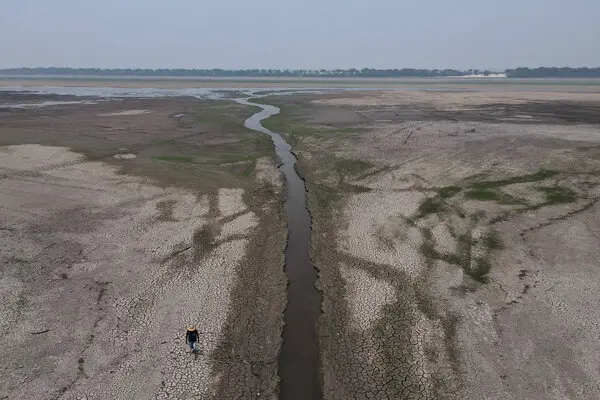The study underscores the urgent need to address deforestation, fossil fuel emissions, and global heating to prevent irreversible damage to the world’s largest land-based carbon sink.
In a groundbreaking study, scientists reveal that the unprecedented drought that struck the Amazon rainforest in 2023 was exacerbated by the climate crisis, raising concerns about the region’s proximity to a tipping point. The study underscores the urgent need to address deforestation, fossil fuel emissions, and global heating to prevent irreversible damage to the world’s largest land-based carbon sink.
In 2023, the Amazon rainforest experienced its most severe drought on record, according to a study highlighting the profound impact of the climate crisis. The research, conducted by the World Weather Attribution team, indicates that the drought reached an “exceptional” level, with devastating consequences that reverberated across the region.
The study reveals that without the influence of planet-warming emissions from fossil fuels, the drought would have been significantly less extreme. Global heating was identified as the primary driver, making the drought 30 times more likely to occur. The return of the El Niño climate phenomenon, often associated with drier conditions, played a smaller role in comparison.
The Amazon’s vulnerability to extreme weather events is particularly alarming due to its proximity to a potential tipping point. The rainforest, already under threat from deforestation, could undergo a mass die-off of trees, releasing substantial amounts of CO2 and further escalating global temperatures.
Millions of people in the Amazon bore the brunt of the drought, with rivers reaching their lowest levels in over a century. The consequences included drinking water shortages, failed crops, power cuts, and heightened wildfire risks. High water temperatures contributed to a mass mortality of river life, including the tragic deaths of over 150 endangered pink river dolphins in a single week.
Regina Rodrigues, a professor at the Federal University of Santa Catarina, Brazil, and part of the research team, emphasized the critical role of the Amazon in the fight against climate change. “If we protect the forest, it will continue to act as the world’s largest land-based carbon sink,” she warned. “But if we allow human-induced emissions and deforestation to push it through the tipping point, it will release large amounts of CO2.”
Simphiwe Stewart, a researcher at the Red Cross Red Crescent Climate Centre, stressed the need for government interventions geared towards helping communities prepare for escalating droughts as the climate warms.
The study employed peer-reviewed methods to compare today’s climate, which is 1.2C hotter, with a cooler, pre-industrial climate. Researchers focused on “agricultural drought,” considering both low rainfall and water evaporation driven by high temperatures.
Global heating was identified as a key factor decreasing rainfall and increasing heat in the Amazon. The extreme drought of 2023, estimated to occur about once every 50 years in today’s climate, is projected to become a recurring event every 13 years if global heating reaches 2C.
The extensive destruction of the rainforest for beef and soy production in recent decades exacerbated the drought. The clearing of vegetation diminishes the land’s ability to retain water, intensifying the impact of drought conditions.
Recent data indicates that the Amazon rainforest is on the brink of a tipping point, with over 75% of the untouched forest losing stability since the early 2000s. This compromised resilience means longer recovery times after droughts and wildfires, amplifying the risk of irreversible damage.
Gareth Redmond-King, at the Energy and Climate Intelligence Unit in the UK, emphasized the critical role of the Amazon in regulating the planet’s climate. He also highlighted the immediate impact on the UK, with approximately half of its food imports coming from climate hotspots in South America. The devastating effects of climate change on South American farmers are expected to translate into potential shortages and higher prices for British consumers.
As the world grapples with the consequences of the extreme drought in the Amazon, urgent global action is imperative to mitigate the effects of the climate crisis, protect vital ecosystems, and secure a sustainable future.
